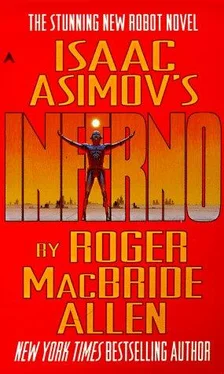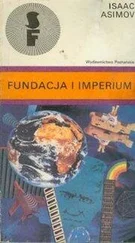Isaac Asimov - Inferno
Здесь есть возможность читать онлайн «Isaac Asimov - Inferno» весь текст электронной книги совершенно бесплатно (целиком полную версию без сокращений). В некоторых случаях можно слушать аудио, скачать через торрент в формате fb2 и присутствует краткое содержание. Год выпуска: 1994, ISBN: 1994, Издательство: Ace Books, Жанр: Фантастика и фэнтези, на английском языке. Описание произведения, (предисловие) а так же отзывы посетителей доступны на портале библиотеки ЛибКат.
- Название:Inferno
- Автор:
- Издательство:Ace Books
- Жанр:
- Год:1994
- ISBN:ISBN: 044-100514-4
- Рейтинг книги:4 / 5. Голосов: 1
-
Избранное:Добавить в избранное
- Отзывы:
-
Ваша оценка:
- 80
- 1
- 2
- 3
- 4
- 5
Inferno: краткое содержание, описание и аннотация
Предлагаем к чтению аннотацию, описание, краткое содержание или предисловие (зависит от того, что написал сам автор книги «Inferno»). Если вы не нашли необходимую информацию о книге — напишите в комментариях, мы постараемся отыскать её.
Inferno — читать онлайн бесплатно полную книгу (весь текст) целиком
Ниже представлен текст книги, разбитый по страницам. Система сохранения места последней прочитанной страницы, позволяет с удобством читать онлайн бесплатно книгу «Inferno», без необходимости каждый раз заново искать на чём Вы остановились. Поставьте закладку, и сможете в любой момент перейти на страницу, на которой закончили чтение.
Интервал:
Закладка:
2
THE RAIN THUNDERED DOWN as the two robots approached the Winter Residence. Humans hated venturing out in such weather, but wet and cold did not bother robots—and it allowed for private conversation. As one of the two robots was the only one on the planet not equipped with a hyperwave comm system, the chance for private face-to-face talk was not one to be ignored.
They paused a hundred meters from the structure and looked at the handsome building, a long, low structure of the most well-proportioned lines. The first robot turned to the second. “Do you truly think that it is wise for us to proceed?” it asked.
“I cannot say,” the second one answered. “We are entitled to be here. We were invited, and the Governor did wish us to attend. But the dangers are real. The situation is so complex that I doubt anyone, human or robot, could work out the possible ramifications.”
“Should we then, perhaps, turn back?” the first asked. “Might that not be for the best rather than risking disaster?”
The second one shook its head no, using the human gesture with a smooth, unmechanical grace that was most unusual for a robot. “We should attend,” it said, its voice firm and decisive. “It is the Governor’s desire that we do so and I do not wish to annoy him. I have learned a great deal about human politics—enough to say that I do not know the first thing about it. But the Governor asked us to come, and I owe the Governor much—as you do yourself. It would not be wise for us to refuse him. Were it not for his grant of a waiver to Dr. Leving, I would have been destroyed. Were it not for his support of Dr. Leving’s work, you and all the other New Law robots would never have existed in the first place. And I need not remind you of the power he still holds over us.”
“Good points all, I grant you,” the first robot conceded. “He has done much for us. Let us hope we are able to convince him to do more without recourse to—unpleasantness.”
“Such recourse would be unwise,” the second robot warned. “I know humans better than you, and I fear that you underestimate the possible repercussions of your contingency plans.”
“Then let us hope the contingency does not arise. Come, I have always been curious to see what these affairs are like. Let us go in, friend Caliban.”
“After you, Prospero.”
There was, needless to say, some awkwardness with the various human guards before their invitations were found to be genuine and the two robots were granted entrance. But both had long since learned to take things in stride, and they were soon past the last security checkpoint. They made their way down the entryway and into the Grand Hall, Caliban a step or two ahead of his friend.
The room had been full of gaiety and laughter a moment before, but all was smothered in silence the moment Caliban and Prospero walked into the main drawing room, a drop or two of rain still clinging to their metallic bodies.
Caliban looked around the room with a steady gaze. Caliban was used to rooms going quiet when he walked in. He had been through it all many times before. He had learned long ago there was no point in his trying to be inconspicuous, or in hoping that no one would know who he was. Caliban was well over two meters tall, his lean, angular frame painted a gleaming metallic red. His glowing deep blue eyes stood out in startling contrast. But it was not his appearance that frightened people. It was his reputation. He was the robot without Laws, the only one in the universe. Caliban, the robot accused—but cleared—of attempting the murder of his creator.
Caliban, the robot who could kill, if he chose.
The crowd in the room seemed to melt away from them, leaving a wide circle of empty space between the two robots and the room full of humans. People were whispering and pointing, nudging each other, staring.
“I see there is an advantage in arriving with you,” Prospero said, speaking in a low voice. “I am often not well treated at human social events, but with you at my side, I will be quite safe here—no one will pay the least attention to me.”
Prospero was perhaps a head shorter than his friend, stockier, less imposing. He was painted a reflective jet-black, with eyes that glowed a deep orange.
“I would wish that I received far less attention, I assure you,” Caliban replied. The robot who could kill. That was all he would ever be to most people, to Caliban’s endless frustration. That was all most people knew of him, or cared to know.
True, he knew he could, in theory, kill a man quite easily. He could reach out and break a man’s neck if he wished. There was no First Law to stop him, no injunction burned into the deepest circuits of his brain to render him immobile at the very thought of such an act. All true, but what of it?
He could kill if he wished—but he did not wish to do it. Every human being was just as capable of murder. No built-in, unstoppable injunction prevented one human from killing another, yet humans did not regard each other first and foremost as potential murderers.
Caliban had learned long ago that no one, human or robot, would ever trust him completely. He was the robot without Laws, the robot unconstrained by the First Law prohibition against harming humans. “Now it all begins,” he said wearily. “The whispers, the crowds of people nudging each other and pointing to me, the one or two brave souls who will come up to me, approaching me like some sort of wild beast. They will work up their nerve and then they will ask me the same questions I have heard over and over again.”
“And what might those questions be?” asked a voice behind them.
Caliban turned around, a bit startled. “Good evening to you, Dr. Leving,” Caliban said. “I am somewhat surprised to find you here.”
“I could say the same about the two of you,” Fredda Leving replied with a smile. She was a small, youthful-looking, light-skinned woman, her dark brown hair cut short. She was stylishly dressed in a dark, flowing dress with a high collar, a simple, understated gold chain about her neck. “What in Space would tempt you to come here, of all places? You got dragged to enough of these things back on the mainland, and you never seemed to enjoy them there. I’d have thought you’d been at enough human parties to last you a lifetime.”
“True enough, Dr. Leving.” In the year since the Governor granted Dr. Leving the waiver allowing her to possess a Lawless robot, she had taken Caliban along to a number of social functions, trying to drum up support for New Law robots.
It could be said of Fredda Leving that she had an odd collection of brain-children. Among other robots, she had built Caliban and Prospero and Donald, naming each after a character created by a certain old Earth playwright, a naming scheme she used only on her most prized creations. “Caliban was a good sport about my taking him to parties,” she said to Prospero, “but we both got tired of his being treated like some sort of prize exhibition, a freak of science I had created. The Lawless Robot and his Mad Creator—and we seem to be getting the same reception tonight. So why are you here?”
“I am afraid I am to blame for Caliban’s presence,” Prospero replied. “Caliban has often spoken to me about these events. I confess I wanted to see one for myself.” It was not, Caliban noted, the whole truth, but it would suffice. There was certainly no need to tell Fredda Leving more than that.
“How, exactly, has he described cocktail parties?” Fredda asked.
“As an ancient ritual, supposedly pleasurable, that no one has actually enjoyed for thousands of years, “ Prospero replied.
Fredda Leving laughed out loud. “More or less true, I’m afraid. But I would like to know, Caliban. What are the questions you are asked all the time?”
Читать дальшеИнтервал:
Закладка:
Похожие книги на «Inferno»
Представляем Вашему вниманию похожие книги на «Inferno» списком для выбора. Мы отобрали схожую по названию и смыслу литературу в надежде предоставить читателям больше вариантов отыскать новые, интересные, ещё непрочитанные произведения.
Обсуждение, отзывы о книге «Inferno» и просто собственные мнения читателей. Оставьте ваши комментарии, напишите, что Вы думаете о произведении, его смысле или главных героях. Укажите что конкретно понравилось, а что нет, и почему Вы так считаете.








